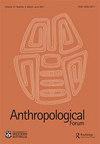States Reimagined: COVID-19, the Ordinary, and Extraordinary in Aotearoa/New Zealand
IF 0.7
3区 社会学
Q3 ANTHROPOLOGY
引用次数: 3
Abstract
ABSTRACT Shifting public imaginaries have played a vital role in shaping government and citizen responses to COVID-19 in Aotearoa/New Zealand. During the nation’s first COVID-19 lockdown, the general public expressed support, and at times even enthusiasm, for strict measures put in place to curb the spread of the virus. Less than a year later, what had begun as a nationalistic rallying cry to ‘unite together’ and ‘be kind’ while ‘combatting COVID-19’ took on more sinister tones through government-sponsored moral panic, including the blaming and shaming of those who did not or could not uphold COVID-19 regulations. At the same time, growing dissent, particularly by those protesting COVID-19 vaccine mandates, steadily chipped away at government-promoted images of national solidarity. By early 2022, with the spread of omicron, the government stepped away from attempting to eradicate the virus and jettisoned its collectivist message, highlighting instead each New Zealander’s ‘personal responsibility’ to try and stay well. This article traces how citizen-State relations have been reimagined in Aotearoa/NZ over the first two years of the pandemic, the effects of various pubic- and government-supported moral imaginaries in enabling the government to exercise ‘extra-ordinary’ powers, and the power and fragility of national consensus-building in the midst of crisis. I suggest how examining the pandemic and pandemic responses as a ‘collective critical event’ enables us to trace not only how it altered citizens’ visions of the State, but their active engagements in reconfiguring and reimagining various states of social, economic, and cultural life.重新构想的国家:新冠肺炎,在奥特阿瓦/新西兰的平凡与非凡
在新西兰奥特罗阿,公众想象的转变在塑造政府和公民应对COVID-19方面发挥了至关重要的作用。在全国第一次COVID-19封锁期间,公众对采取严格措施遏制病毒传播表示支持,有时甚至是热情。不到一年后,“抗击COVID-19”时“团结一致”和“善良”的民族主义口号,通过政府支持的道德恐慌,包括指责和羞辱那些没有或不能遵守COVID-19法规的人,变得更加险恶。与此同时,越来越多的异议,特别是那些抗议COVID-19疫苗授权的人,逐渐削弱了政府宣传的民族团结形象。到2022年初,随着欧米克隆病毒的传播,新西兰政府不再试图根除这种病毒,也放弃了其集体主义信息,而是强调每个新西兰人都有“个人责任”,努力保持健康。本文追溯了在大流行的头两年里,新西兰如何重新构想公民-国家关系,公众和政府支持的各种道德想象在使政府能够行使“非凡”权力方面的影响,以及在危机中建立国家共识的力量和脆弱性。我认为,将大流行和大流行应对作为一个“集体关键事件”来考察,不仅可以让我们追踪到它如何改变了公民对国家的看法,还可以追踪到他们如何积极参与重新配置和重新构想各种社会、经济和文化生活状态。
本文章由计算机程序翻译,如有差异,请以英文原文为准。
求助全文
约1分钟内获得全文
求助全文
来源期刊

Anthropological Forum
ANTHROPOLOGY-
CiteScore
3.60
自引率
10.00%
发文量
14
期刊介绍:
Anthropological Forum is a journal of social anthropology and comparative sociology that was founded in 1963 and has a distinguished publication history. The journal provides a forum for both established and innovative approaches to anthropological research. A special section devoted to contributions on applied anthropology appears periodically. The editors are especially keen to publish new approaches based on ethnographic and theoretical work in the journal"s established areas of strength: Australian culture and society, Aboriginal Australia, Southeast Asia and the Pacific.
 求助内容:
求助内容: 应助结果提醒方式:
应助结果提醒方式:


